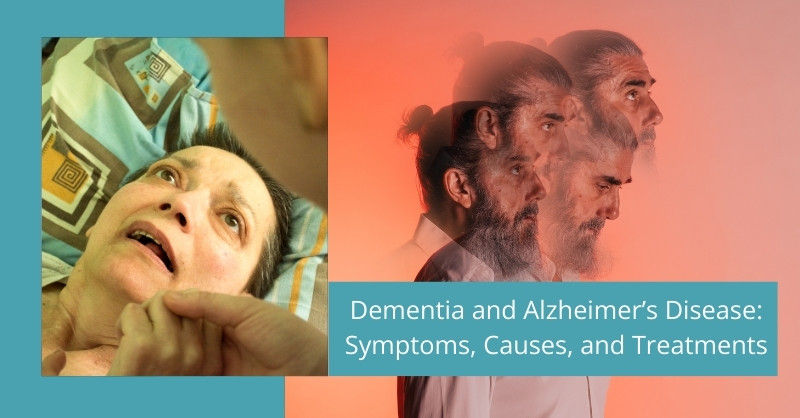Dementia and Alzheimer’s are two of the most common cognitive disorders affecting aging individuals. Understanding the causes and symptoms of Dementia and Alzheimer’s is crucial for managing their impact on daily life. While both conditions affect memory, cognition, and the ability to perform everyday tasks, they differ in their underlying causes and progression. In this article, we will examine the key causes, identify common symptoms, and explore available treatment options and caregiving strategies for both patients and their families.
Understanding Dementia and Alzheimer’s: Causes, Symptoms, and Care
The key to addressing Dementia Alzheimer’s Causes Symptoms lies in understanding the biological differences between the two. Dementia is an umbrella term that refers to a range of symptoms affecting memory, thinking, and behavior. Alzheimer’s, on the other hand, is a specific disease that falls under the dementia category. The symptoms of Alzheimer’s often appear gradually, affecting thinking, memory, and decision-making. As Alzheimer’s disease progresses, cognitive function declines, and the ability to perform everyday activities becomes increasingly difficult.
Dementia may develop as a result of multiple causes, such as a history of strokes, chronic diseases like Parkinson’s, or brain injuries. Alzheimer’s disease, however, is primarily driven by the build-up of amyloid plaques and tau tangles in the brain, which disrupts communication between neurons. The exact cause of these buildups is still being researched.
Key Symptoms of Dementia and Alzheimer’s Disease
Recognizing Dementia Alzheimer’s Causes Symptoms early on can help families get the support and treatment needed quickly. The symptoms of both diseases overlap, but certain signs are characteristic of each condition.
- Memory loss – This is often the first sign of Alzheimer’s and generally involves forgetfulness that worsens over time. People may have trouble remembering recent conversations or events.
- Cognitive decline – Both dementia and Alzheimer’s can cause cognitive decline. This includes problems with problem-solving, planning, or carrying out tasks that were once easy.
- Confusion and disorientation – Individuals with Alzheimer’s might not recognize familiar people or places, even within their own home.
- Personality or mood changes – In the case of Alzheimer’s, drastic shifts in mood or personality, including anxiety, irritability, and suspicion, are common. With dementia, these changes may also occur, depending on the cause.
- Difficulty with language – Both conditions often lead to the inability to find the right words or understand spoken language.
Causes of Alzheimer’s Disease: A Deeper Look

Understanding the Dementia Alzheimer’s Causes Symptoms starts with knowing the causes behind Alzheimer’s disease. Genetics, age, and environmental factors play a pivotal role in the development of this neurodegenerative condition. A person’s risk of developing Alzheimer’s increases significantly with age, especially after the age of 65. Furthermore, if someone in a person’s immediate family has Alzheimer’s, their own risk increases, indicating a potential genetic link.
Research into Alzheimer’s also highlights other risk factors such as poor cardiovascular health, high blood pressure, and high cholesterol as being linked to the development of the disease. Moreover, factors like inflammation in the brain and insulin resistance have been increasingly recognized as contributing to Alzheimer’s development.
Treatment Options for Dementia and Alzheimer’s
Although there is currently no cure for Alzheimer’s disease or most forms of dementia, there are treatments that can alleviate symptoms or slow the progression of cognitive decline. Medications for Alzheimer’s disease, such as acetylcholinesterase inhibitors like Donepezil and Rivastigmine, help by increasing neurotransmitters in the brain involved in memory and learning.
In addition, medications that help control symptoms such as depression, anxiety, or sleep disturbances are often prescribed to manage the associated mood disorders that come with cognitive decline.
Non-pharmacological interventions also play a key role in treatment. For instance, cognitive stimulation through activities like puzzles, exercises, and memory training can slow down the decline, albeit temporarily. Social engagement, such as participation in group activities, can boost the patient’s quality of life and maintain cognitive functions.
Providing Care for Someone with Dementia or Alzheimer’s: Understanding Causes and Symptoms
Caring for a loved one with Dementia Alzheimer’s Causes Symptoms demands a great deal of patience, understanding, and flexibility. Providing support can be both emotionally and physically draining, so caregivers should seek help when needed.
1. Establish a Routine
One of the first steps in caregiving is setting a daily routine. Consistency provides structure for individuals with dementia and Alzheimer’s, which reduces confusion and anxiety. Routine activities can include regular exercise, healthy meals, and engaging in cognitive stimulation like puzzles or reading.
2. Simplify Communication
People living with dementia or Alzheimer’s often find it difficult to understand complicated statements or follow long instructions. Simple and direct language, paired with non-verbal cues, can help them understand more clearly.
3. Create a Safe Environment
Modify the living space to ensure safety. This includes removing hazards, improving lighting, and labeling objects around the house to aid in navigation. Creating a peaceful environment helps reduce stress and confusion.
4. Encourage Social Interaction
It’s important to encourage individuals to stay socially engaged as much as possible. Loneliness and isolation can exacerbate symptoms. Regular socializing, whether with friends, family, or community groups, contributes significantly to mental health.
Preventing Dementia and Alzheimer’s: Understanding Causes and Symptoms

While there’s no guaranteed way to prevent Dementia Alzheimer’s Causes Symptoms, research suggests that several strategies may reduce the risk of developing Alzheimer’s and other forms of dementia. These include maintaining a healthy diet, engaging in regular physical activity, staying mentally stimulated through learning or activities, and reducing stress through relaxation techniques like meditation.
Protecting the brain from environmental damage and adopting a healthy lifestyle may help reduce the likelihood of cognitive decline.
Conclusion: Managing Dementia and Alzheimer’s
In conclusion, Dementia Alzheimer’s Causes Symptoms are complex, but by understanding these conditions, early detection, and taking proactive steps, individuals can significantly improve the quality of life for both patients and caregivers. With the proper care, support, and treatment options, the impact of dementia and Alzheimer’s disease can be better managed, allowing individuals to live fulfilling lives despite the challenges posed by these cognitive disorders. Regular medical advice and intervention play a crucial role in ensuring the well-being of those affected by Alzheimer’s and other dementia-related conditions.
For more resources on Alzheimer’s care, treatment options, and managing dementia, refer to expert guides and caregiver support networks available both online and in local communities.



